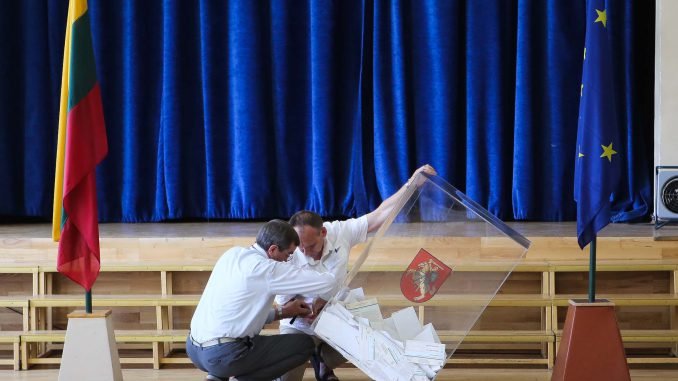
Advance voting had started in the country’s municipalities early on Monday morning for the second round of presidential elections and the European Parliament elections, Lrytas.lt wrote in editorial.
The advance voting will be held throughout the week, from 8AM to 8PM Monday to Friday.
The second round of presidential elections features former minister of finance, member of Seimas Ingrida Šimonytė and economist Gitanas Nausėda. Both candidates received over 30% of the vote in the first round and one of them will replace incumbent President Dalia Grybauskaitė, who has been in office since 2009.
With advance voting having started, fewer people are gathering at the Vilnius and Kaunas municipalities than during the first round two weeks ago.
Different people different opinions
26-year-old Karolis Ruginis, who works in the IT sector, told BNS that he voted for G. Nausėda for his knowledge of macroeconomics and ability to bring politicians together because he is independent.
“I chose based on my values and because this candidate matched my criteria, which is why I voted for him,” K. Ruginis, who voted in Vilnius, said.
79-year-old Milda Skučaitė, who voted for I. Šimonytė, said that she wants a resolute president.
“Her rival is a bit too pretty. […] They are both similar, but the question is, who would be stronger. I think that Ingrida would be,” the retiree said.
Meanwhile Kaunas resident Kęstutis chose to support I. Šimonytė because he always supports the Conservatives.
“I love women, but that’s not all – I am also a conservative,” the 58-year-old man, who works in engineering.
62-year-old economist Audronė Pečkienė voted for G. Nausėda, albeit noting that both candidates appear decent. Nevertheless, the Kaunas resident said that she was drawn by G. Nausėda’s education and promises to unite.
“I like how he does not incite hatred. I believe that we need harmony at the moment, when such unpleasant things are happening. He appears to be able to unite,” A. Pečkienė stated.
16 electoral rolls to European Parliament
The European Parliament elections feature 16 parties and civic electoral committees’ electoral rolls. Lithuania will have a total of 11 MEPs.
This ballot is a little more complex – voters will have to choose one of the rolls and, at the bottom, mark priority votes for the roll’s candidates.
79-year-old Nijolė from Kaunas said that in the European Parliament elections, she supports candidates, who she believes can defend Lithuania’s interests.
“It is important for them to defend our ragged homeland, to make sure that you too do not depart elsewhere. I would go, but I no longer am able to,” the retiree said.
“We have to straighten ourselves out somehow, not just help others. We should not clash with our neighbours – that’s my basis,” she added.
It is predicted that following the elections, the Eurosceptic far right will strengthen its positions in European Parliament.
Marius Sviderskas from Vilnius says he voted for pro-European candidates.
“I would not take a person on my team, who is against the team. Equally, here I don’t want someone on the European Parliament, who would seek to destroy it from within,” the 31-year-old said.
Voting in hospitals, care homes, the military and prisons will be held from Wednesday to Friday.
Voting at home is planned for Friday and Saturday. Home voting is available for voters at or above the age of 70, who cannot visit their constituency due to health conditions.
Voting on election day on Sunday will be held from 7AM to 8PM.


Be the first to comment